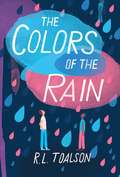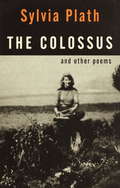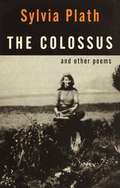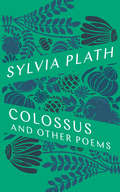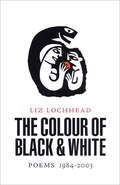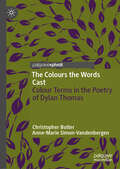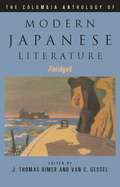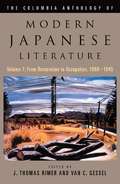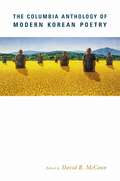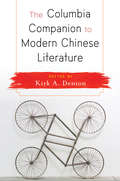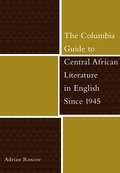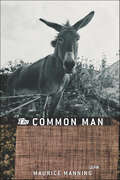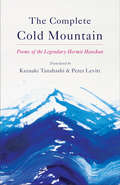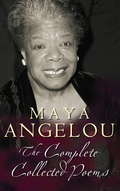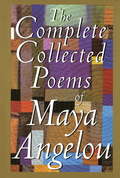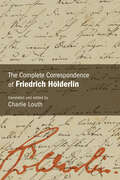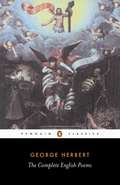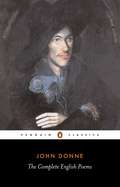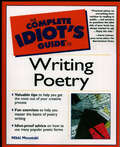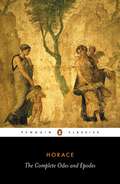- Table View
- List View
The Colors of the Rain
by R. L. ToalsonThis historical middle grade novel written in free verse, set against the backdrop of the desegregation battles that took place in Houston, Texas, in 1972, is about a young boy and his family dealing with loss and the revelation of dark family secrets.Ten-year-old Paulie Sanders hates his name because it also belonged to his daddy—his daddy who killed a fellow white man and then crashed his car. With his mama unable to cope, Paulie and his sister, Charlie, move in with their Aunt Bee and attend a new elementary school. But it’s 1972, and this new school puts them right in the middle of the Houston School District’s war on desegregation. Paulie soon begins to question everything. He hears his daddy’s crime was a race-related one; he killed a white man defending a black man, and when Paulie starts picking fights with a black boy at school, he must face his reasons for doing so. When dark family secrets are revealed, the way forward for everyone will change the way Paulie thinks about family forever. The Colors of the Rain is an authentic, heartbreaking portrait of loss and human connection during an era fraught with racial tension set in verse from debut author R. L. Toalson.
The Colossus
by Sylvia PlathWith this startling, exhilarating book of poems, which was first published in 1960, Sylvia Plath burst into literature with spectacular force. In such classics as "The Beekeeper's Daughter," "The Disquieting Muses," "I Want, I Want," and "Full Fathom Five," she writes about sows and skeletons, fathers and suicides, about the noisy imperatives of life and the chilly hunger for death. Graceful in their craftsmanship, wonderfully original in their imagery, and presenting layer after layer of meaning, the forty poems in The Colossus are early artifacts of genius that still possess the power to move, delight, and shock.From the Trade Paperback edition.
The Colossus & Other Poems
by Sylvia PlathWith this startling, exhilarating book of poems, which was first published in 1960, Sylvia Plath burst into literature with spectacular force. In such classics as "The Beekeeper's Daughter," "The Disquieting Muses," "I Want, I Want," and "Full Fathom Five," she writes about sows and skeletons, fathers and suicides, about the noisy imperatives of life and the chilly hunger for death. Graceful in their craftsmanship, wonderfully original in their imagery, and presenting layer after layer of meaning, the forty poems in The Colossus are early artifacts of genius that still possess the power to move, delight, and shock.
The Colossus and Other Poems: And Other Poems (Vintage International)
by Sylvia PlathWith this startling, exhilarating book of poems, which was first published in 1960, Sylvia Plath burst into literature with spectacular force. In such classics as "The Beekeeper's Daughter," "The Disquieting Muses," "I Want, I Want," and "Full Fathom Five," she writes about sows and skeletons, fathers and suicides, about the noisy imperatives of life and the chilly hunger for death. Graceful in their craftsmanship, wonderfully original in their imagery, and presenting layer after layer of meaning, the forty poems in The Colossus are early artifacts of genius that still possess the power to move, delight, and shock.Penguin Random House Canada is proud to bring you classic works of literature in e-book form, with the highest quality production values. Find more today and rediscover books you never knew you loved.
The Colour of Black & White: Poems 1984–2003
by Liz LochheadThe celebrated Scottish poet presents a collection of poems from the intimate to the bawdy—paired with original linocut artwork by Willie Rodger. Liz Lochhead is one of Scotland&’s most beloved contemporary poets. In this wide-ranging collection, she offers poems of love, death and iconic figures; Jungian archetypes who often speak in their own voices. There are also poems set in her native Lanarkshire; poems dedicated to other poets; and a section of &“unrespectable&” poetry—rude verses, rhyming toasts, and music hall monologues. The collaboration with the printmaker Willie Rodger was also an essential part of the making of this book. Lochhead, long an admirer of Rodger&’s work, felt that he was a kindred spirit. His poetically pared down and essential linocuts accentuate the positive and the negative, the black and the white.
The Colours the Words Cast: Colour Terms in the Poetry of Dylan Thomas
by Christopher Butler Anne-Marie Simon-VandenbergenThis book examines the use of colour terms in the poetry of Dylan Thomas, adopting a primarily linguistic and stylistic - rather than literary - approach. Although critical studies of the poetry of Dylan Thomas abound, systematic and detailed linguistic studies of his poems are relatively rare. The authors&’ main aim is to investigate in detail the use of colour terms, and in particular to link this to the associations between colours and their connotative symbolic meanings, which form the basis for what have been called colour metaphors. They also provide a rich database of these associations which will be of use to researchers who may be interested in the use of colour terms in other texts, whether literary or non-literary. This book will be of interest primarily to academics and advanced students in the field of linguistic stylistics.
The Columbia Anthology of American Poetry
by Jay PariniSelections from America's best-known poets; includes an excellent introduction.
The Columbia Anthology of Modern Japanese Literature: Abridged (Modern Asian Literature Series)
by J. Thomas RimerFeaturing choice selections from the core anthologies The Columbia Anthology of Modern Japanese Literature: From Restoration to Occupation, 1868–1945, and The Columbia Anthology of Modern Japanese Literature: From 1945 to the Present, this collection offers a concise yet remarkably rich introduction to the fiction, poetry, drama, and essays of Japan's modern encounter with the West. Spanning a period of exceptional invention and transition, this volume is not only a critical companion to courses on Japanese literary and intellectual development but also an essential reference for scholarship on Japanese history, culture, and interactions with the East and West.The first half covers the three major styles of literary expression that informed Japanese writing and performance in the late nineteenth and early twentieth centuries: classical Japanese fiction and drama, Chinese poetry, and Western literary representation and cultural critique. Their juxtaposition brilliantly captures the social, intellectual, and political challenges shaping Japan during this period, particularly the rise of nationalism, the complex interaction between traditional and modern forces, and the encroachment of Western ideas and writing. The second half conveys the changes that have transformed Japan since the end of the Pacific War, such as the heady transition from poverty to prosperity, the friction between conflicting ideologies and political beliefs, and the growing influence of popular culture on the country's artistic and intellectual traditions. Featuring sensitive translations of works by Nagai Kafu, Natsume Soseki, Oe Kenzaburo, Kawabata Yasunari, Mishima Yukio, and many others, this anthology relates an essential portrait of Japan's dynamic modernization.
The Columbia Anthology of Modern Japanese Literature: Volume 1: From Restoration to Occupation, 1868-1945 (Modern Asian Literature Series)
by J. Thomas Rimer Van GesselThis comprehensive anthology collects works of fiction, poetry, drama, and essay-writing from a pivotal time in Japanese history. In addition to their literary achievements, the texts reflect the political, social, and intellectual changes that occurred in Japanese society during this period, including exposure to Western ideas and literature, the rise of nationalism, and the complex interaction of traditional and modern forces. The volume offers outstanding, often new translations of classic texts by such celebrated writers as Nagai Kafu, Shimazaki Toson, Natsume Soseki, Kawabata Yasunari, and Yosano Akiko. The editors have also unearthed works from lesser-known women writers, many of which have never been available in English. Organized chronologically and by genre within each period, the volume reveals the major influences in the development of modern Japanese literature: the Japanese classics themselves, the example of Chinese poetry, and the encounter with Western literature and culture. Modern Japanese writers reread the classics of Japanese literature, infused them with contemporary language, and refashioned them with an increased emphasis on psychological elements. They also reinterpreted older aesthetic concepts in light of twentieth-century mentalities. While modern ideas captured the imagination of some Japanese writers, the example of classical Chinese poetry remained important for others. Meiji writers continued to compose poetry in classical Chinese and adhere to a Confucian system of thought. Another factor in shaping modern Japanese literature was the example of foreign works, which offered new literary inspiration and opportunities for Japanese readers and writers. Divided into four chapters, the anthology begins with the early modern texts of the 1870s, continues with works written during the years of social change preceding World War I and the innovative writing of the interwar period, and concludes with texts from World War II. Each chapter includes a helpful critical introduction, situating the works within their literary, political, and cultural contexts. Additionally, there are biographical introductions for each writer.
The Columbia Anthology of Modern Korean Poetry
by Ed. David McCannKorea's modern poetry is filled with many different voices and styles, subjects and views, moves and countermoves, yet it still remains relatively unknown outside of Korea itself. This is in part because the Korean language, a rich medium for poetry, has been ranked among the most difficult for English speakers to learn. The Columbia Anthology of Modern Korean Poetry is the only up-to-date representative gathering of Korean poetry from the twentieth century in English, far more generous in its selection and material than previous anthologies. It presents 228 poems by 34 modern Korean poets, including renowned poets such as So Chongju and Kim Chiha.
The Columbia Anthology of Modern Korean Poetry
by David MccannThe only up-to-date representative gathering of Korean poetry from the twentieth century in English, this volume presents 228 poems by 34 modern Korean poets, including renowned poets such as So Chongju and Kim Chiha.
The Columbia Companion to Modern Chinese Literature
by Kirk A. DentonThe Columbia Companion to Modern Chinese Literature features more than fifty short essays on specific writers and literary trends from the Qing period (1895–1911) to the present. The volume opens with thematic essays on the politics and ethics of writing literary history, the formation of the canon, the relationship between language and form, the role of literary institutions and communities, the effects of censorship, the representation of the Chinese diaspora, the rise and meaning of Sinophone literature, and the role of different media in the development of literature. Subsequent essays focus on authors, their works, and the schools with which they were aligned, featuring key names, titles, and terms in English and in Chinese characters. Woven throughout are pieces on late Qing fiction, popular entertainment fiction, martial arts fiction, experimental theater, post-Mao avant-garde poetry, post–martial law fiction from Taiwan, contemporary genre fiction from China, and recent Internet literature. The volume includes essays on such authors as Liang Qichao, Lu Xun, Shen Congwen, Eileen Chang, Jin Yong, Mo Yan, Wang Anyi, Gao Xingjian, and Yan Lianke. Both a teaching tool and a go-to research companion, this volume is a one-of-a-kind resource for mastering modern literature in the Chinese-speaking world.
The Columbia Guide to Central African Literature in English Since 1945 (The Columbia Guides to Literature Since 1945)
by Adrian RoscoeColumbia's guides to postwar African literature paint a unique portrait of the continent's rich and diverse literary traditions. This volume examines the rapid rise and growth of modern literature in the three postcolonial nations of Zimbabwe, Malawi, and Zambia. It tracks the multiple political and economic pressures that have shaped Central African writing since the end of World War II and reveals its authors' heroic efforts to keep their literary traditions alive in the face of extreme poverty and AIDS. Adrian Roscoe begins with a list of key political events. Since writers were composing within both colonial and postcolonial contexts, he pays particular attention to the nature of British colonialism, especially theories regarding its provenance and motivation. Roscoe discusses such historical figures as David Livingstone, Cecil Rhodes, and Sir Harry Johnston, as well as modern power players, including Robert Mugabe, Kenneth Kaunda, and Kamuzu Banda. He also addresses efforts to create a literary-historical record from an African perspective, an account that challenges white historiographies in which the colonized was neither agent nor informer.A comprehensive alphabetical guide profiles both established and emerging authors and further illustrates issues raised in the introduction. Roscoe then concludes with a detailed bibliography recommending additional reading and sources. At the close of World War II the people of Central Africa found themselves mired in imperial fatigue and broken promises of freedom. This fueled a desire for liberation and a major surge in literary production, and in this illuminating guide Roscoe details the campaigns for social justice and political integrity, for education and economic empowerment, and for gender equity, participatory democracy, rural development, and environmental care that characterized this exciting period of development.
The Coming Indoors and Other Poems
by Bernard Lionel EinbondThis collection of haiku poetry from Bernard Lionel Einbond is a spectacular.Part one includes Rising Darkness, Countenances of the Poor, and The Coming Indoors, then part two concludes with Insomnia in Haiku Form. Each poem expressed paints a simple mental picture of each experience with Bernard:-The bright one starin the black wide sky...observethe old wise owl.-Have you ever heardthe sound of snowflakes fallingon the snow? Listen.he snow? Listen.
The Common Man: Poems
by Maurice ManningThe Common Man, Maurice Manning’s fourth collection, is a series of ballad-like narratives, set down in loose, unrhymed iambic tetrameter, that honors the strange beauty of the Kentucky mountain country he knew as a child, as well as the idiosyncratic adventures and personalities of the oldtimers who were his neighbors, friends, and family. Playing off the book’s title, Manning demonstrates that no one is common or simple. Instead, he creates a detailed, complex, and poignant portrait—by turns serious and hilarious, philosophical and speculative, but ultimately tragic—of a fast-disappearing aspect of American culture. The Common Man’s accessibility and its enthusiastic and sincere charms make it the perfect antidote to the glib ironies that characterize much contemporary American verse. It will also help to strengthen Manning’s reputation as one of his generation’s most important and original voices.
The Complete Cold Mountain: Poems of the Legendary Hermit Hanshan
by Peter Levitt Kazuaki TanahashiA fresh translation--and new envisioning--of the most accessible and beloved of all classic Chinese poetry.Welcome to the magical, windswept world of Cold Mountain. These poems from the literary riches of China have long been celebrated by cultures of both East and West—and continue to be revered as among the most inspiring and enduring works of poetry worldwide. This groundbreaking new translation presents the full corpus of poetry traditionally associated with Hanshan (“Cold Mountain”) and sheds light on its origins and authorship like never before. Kazuaki Tanahashi and Peter Levitt honor the contemplative Buddhist elements of this classic collection of poems while revealing Hanshan’s famously jubilant humor, deep love of solitude in nature, and overwhelming warmth of heart. In addition, this translation features the full Chinese text of the original poems and a wealth of fascinating supplements, including traditional historical records, an in-depth study of the Cold Mountain poets (here presented as three distinct authors), and more.
The Complete Collected Poems
by Dr Maya AngelouMaya Angelou's poetry - lyrical and dramatic, exuberant and playful - speaks of love, longings, partings; of Saturday night partying and the smells and sounds of Southern cities; of freedom and shattered dreams. Of her poetry, Kirkus Reviews has written, 'It is just as much a part of her autobiography as I Know Why the Caged Bird Sings, Gather Together in My Name, Singin' and Swingin' and Gettin' Merry Like Christmas, and The Heart of a Woman'.
The Complete Collected Poems of Maya Angelou
by Maya AngelouFor the first time, the complete collection of Maya Angelou's published poems-including "On the Pulse of Morning"-in a permanent collectible, handsome hardcover edition.From the Hardcover edition.
The Complete Correspondence of Friedrich Hölderlin
by Friedrich HölderlinThe first English translation of Hölderlin's complete correspondence, with a full introduction and notes.Friedrich Hölderlin (1770–1843) is widely acknowledged to be one of the most significant European poets and thinkers. His poems fascinate and compel; his role in the development of German Idealism is well-known; and his writings continue to shape philosophical reflections on subjectivity and the place of poetry in the world. Hölderlin's correspondence is indispensable for anyone wanting to come to terms with his work, yet until now only selections have been available in English. This new and complete edition, which also includes all the surviving letters to Hölderlin, ranges from early letters written while he was still at school, via letters responding to the French Revolution and its consequences in Germany, relaying to Hegel his arguments with Fichte's lectures, or setting out his poetic thinking, to the final letters written in his madness to his mother. The chief source of what we know of Hölderlin’s biography, this correspondence vitally illuminates his poetry and thought at every point.
The Complete English Poems
by George HerbertGeorge Herbert combined the intellectual and the spiritual, the humble and the divine, to create some of the most moving devotional poetry in the English language. His deceptively simple verse uses the ingenious arguments typical of seventeenth-century 'metaphysical' poets, and unusual imagery drawn from musical structures, the natural world and domestic activity to explore a mosaic of Biblical themes. From the wit and wordplay of 'The Pulley' and the formal experimentation of 'Easter Wings' and 'Paradise', to the intense, highly personal relationship between man and God portrayed in 'The Collar' and 'Redemption', the works collected here show the transcendental power of divine love.
The Complete English Poems
by John DonneNo poet has been more wilfully contradictory than John Donne, whose works forge unforgettable connections between extremes of passion and mental energy. From satire to tender elegy, from sacred devotion to lust, he conveys an astonishing range of emotions and poetic moods. Constant in his work, however, is an intensity of feeling and expression and complexity of argument that is as evident in religious meditations such as 'Good Friday 1613. Riding Westward' as it is in secular love poems such as 'The Sun Rising' or 'The Flea'. 'The intricacy and subtlety of his imagination are the length and depth of the furrow made by his passion,' wrote Yeats, pinpointing the unique genius of a poet who combined ardour and intellect in equal measure.
The Complete Idiot's Guide to Writing Poetry
by Nikki MoustakiDiscover the poet within! You&’ve read poetry that has touched your heart, and you&’d like to improve your own writing technique. But even though you have loads of inspiration, you&’re discovering that good instruction can be as elusive as a good metaphor. The Complete Idiot&’s Guide® to Writing Poetry will help you compose powerful, emotion-packed poems that you can be proud of. You&’ll learn: • Simple explanations of poetry building blocks, such as metaphor, imagery, symbolism, and stanzas. • Steps to the poetic process. • Easy-to-follow guidelines for writing sonnets, sestinas, narrative poems, and more. • Fun exercises to help you master the basics of poetry writing. • How to avoid clichés and other poetry pitfalls. • Advice on writers&’ conferences and workshops. • Tips on getting your poetry published. • Good poems that will inspire your own work. • Strategies to beat writer&’s block.
The Complete Odes and Epodes
by HoraceHorace (65-8 bc) was one of the greatest poets of the Golden or Augustan age of Latin literature, a master of precision and irony who brilliantly transformed early Greek iambic and lyric poetry into sophisticated Latin verse of outstanding beauty. Offering allusive and exquisitely crafted insights into the brief joys of the present and the uncertain nature of the future, his Odes and Epodes explore such diverse themes as the virtues of pastoral life, the joys of wine, friendship and love, and the poet's personal anguish following Brutus' defeat at the battle of Phillipi. Ranging from subtle and tender hymns to the gods to bawdy celebrations of human passions, they remain among the most influential of all poems, inspiring poets from the Roman era to the European Renaissance, the Enlightenment and beyond.
